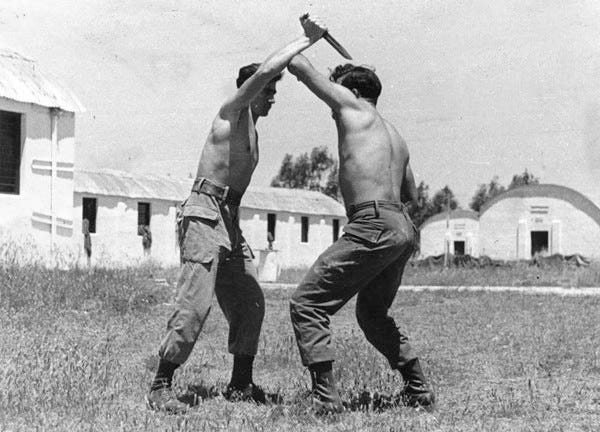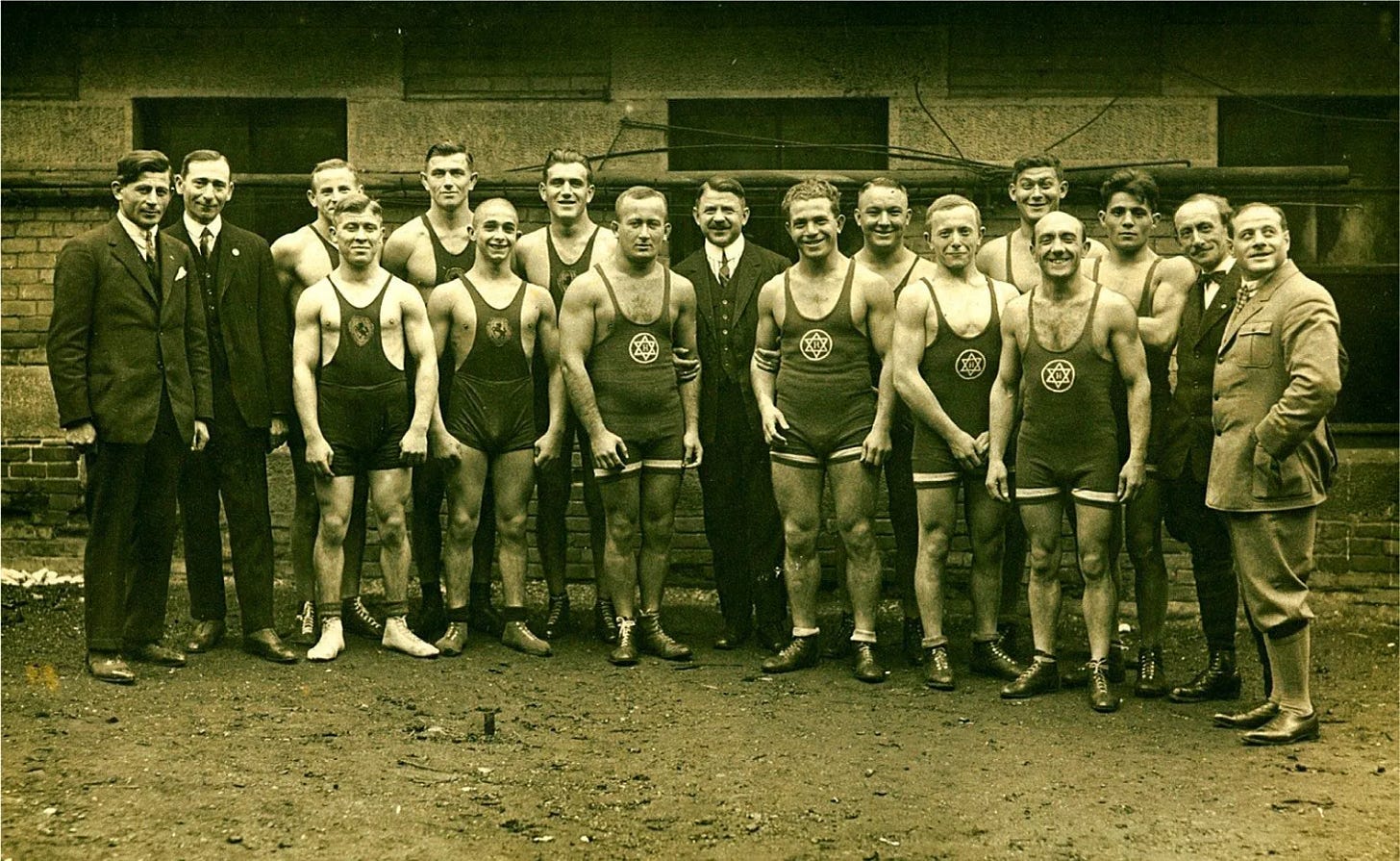Dear Jews, it's time for Tikkun Olam 2.0.
If we truly want to make the world a better place, let’s start by making hatred have real consequences, and let’s restore the norms that insist bigotry is unacceptable — “by any means necessary.”
Please consider supporting our mission to help everyone better understand and become smarter about the Jewish world. A gift of any amount helps keep our platform free of advertising and accessible to all.
You can also listen to the podcast version of this essay on Apple Podcasts, YouTube Music, YouTube, and Spotify.
Some 80 years after the worst chapter in modern history, the Holocaust remains an integral memory.
Memory alone, though, is not enough. Neither is education. For either to mean anything, memory and education must be transformed into durable, practical actions that prevent recurrence and resurgence. The ultimate lesson of the Holocaust is therefore not merely to remember, not just to say “Never Again,” but to act: to defend, to deter, to strengthen.
When history is taught only as facts without the texture of action, the same mechanisms of hatred can reawaken in new guises. See: “Anti-Zionism.”
The responsibility that memory imposes is practical. As the great Israeli statesman Abba Eban put it, “Every generation must earn its own freedom.” That means defending our institutions, defending our communities, and defending ourselves. An informed, vigilant public is society’s best immune system against the normalization of hatred.
But vigilance for vigilance’s sake is not anywhere near sufficient. It must be matched by the practical need for self-protection.
Of course, self-defense is not the same as violence. Violence, understood as aggression aimed at domination, revenge, or the destruction of the other for its own sake, corrodes the moral framework that protects a community’s soul.
By contrast, self-defense is an act oriented toward preserving life, dignity, and the conditions for flourishing. It is reactionary (for the most part) and constrained by moral judgment. A community that can deter attacks through capable means reduces the likelihood of those attacks altogether. Deterrence is not vindictiveness; it is a pragmatic mechanism that protects the vulnerable and stabilizes society.
The necessity of force in certain circumstances should be recognized without romanticizing violence. Courage and strength are virtues when they preserve life and prevent abuse; they are not virtues when they are ends in themselves. Jews generally come in peace, but there’s no sense in being tolerant of intolerant people.
The present moment offers many instructive examples of how these tensions play out in civilian life. When Jewish events are habitually targeted, when ongoing rhetoric from leaders inflames local tensions, when mobs continuously attempt to intimidate or injure, passivity and diplomacy are no longer viable options.
As we say in Israel, “The Arabs only understand force.” I imagine the same applies to Jew-haters elsewhere.
Take, for example, the story of an Israel-related event in Toronto last week, where anti-Israel activists stormed a private venue, injuring one speaker and damaging property. The attack came just days after Toronto Mayor Olivia Chow faced criticism for describing “the genocide in Gaza,” a remark that Jewish groups warned could inflame tensions in the city. Clearly, warnings and lip-service aren’t doing the job.
The event, organized by the student group Students Supporting Israel at Toronto Metropolitan University and featuring Israeli soldiers, was moved off campus at the last minute for safety reasons. Despite the secrecy, about 40 masked agitators found the venue and forced their way inside, breaking glass and attacking participants.
Israeli-American speaker Jonathan Karten was one of them. He came to Toronto to talk to students about his uncle, Sharon Edri, an Israeli soldier kidnapped and murdered by Hamas in 1996. “As soon as we got there, we were attacked by roughly forty protesters, terrorists, whatever you want to call them,” he said. “They were waiting for us before we even started speaking. It’s not something I assumed would happen in a civilian population in a Western country.”
He’s right, this isn’t normal in the West, but do you know where mob rule is normal? Gaza, under Hamas. Is that the direction we want our societies to be pushing toward?
Fortunately, Jonathan Karten did what he absolutely should have done: He promptly grabbed each of the mobsters by their clothes and literally threw them out of the building.
Contrast that with the Center for Israel and Jewish Affairs, which sent a letter to the Toronto mayor about her “reckless, divisive, and dangerous” comments. Letters don’t work. You cannot be diplomatic with undiplomatic people. If people want to mess with the Jews, let them feel the very real consequences. As the kids these days like to say: Play stupid games, win stupid prizes.
Israel knows a thing or two about this logic. Last month, Abakar Abakarov was found dead in Istanbul. He was the Dagestani Islamist activist accused of administering a Telegram channel that helped incite the 2023 antisemitic pogrom at Makhachkala International Airport. During the pogrom, more than 20 people were injured, and passengers from Israel hid in the terminal before being airlifted to safety. I won’t name names, but I have a feeling his killer’s background starts with Mo and rhymes with rod. Again, if you want to play stupid games, don’t be surprised when you win stupid prizes.
To remember the Holocaust is to make it a forward-facing project. It is not enough to commemorate; we must build, rebuild, and defend. Living in a world where “better to be alive and feared than dead and pitied” is an aphorism for agency — to choose life with dignity even in the face of hostility. The Talmud is filled with nuggets of wisdom, and one of them is: “If someone comes to kill you, rise up and kill him first.”
Unfortunately, many Jewish communities have raised an entire generation of Jews on the ambiguous, theoretical concept known as “tikkun olam” (repairing the world). But you cannot “repair the world” if you are defenseless and vulnerable. Idealism without defense is not a survival strategy.
And even if we are to indulge those who are drunk on “repairing the world,” should this principle not include refusing to tolerate Jew-hatred in any of its forms? If we truly want to make the world a better place, let’s start by making hatred costly, and let’s restore the norms that insist bigotry is unacceptable — “by any means necessary.”
Perhaps we can call this Tikkun Olam 2.0.
Some argue that Jews in New York City, London, Paris, and Toronto should simply leave. Those voices forget who helped build those cities. I am not ready to concede those places and others to fear. Stand your ground and defend your family, your community, and your right to public safety. Defense isn’t a betrayal of principle; it is the necessary condition for practicing any higher ideal. Plus, power used appropriately protects more than one group; it stabilizes the surrounding areas for everyone.
I’m reminded of the Jewish wrestlers who used to travel with the Jewish sports team “Hakoah Vienna” in the early 1900s — to serve as their bodyguards. These were men who understood that strength translates to vitality, that muscle and spirit together could reclaim dignity in a world determined to strip it away. They embodied something deeper than athleticism: the courage to be disliked, to walk into hostile environments without hesitation, to wear Jewish identity as a badge of defiance.
After touring Germany in the early 1920s, a prominent newspaper commented that Hakoah Vienna “had helped to do away with the fairy tale about the physical inferiority of Jews.” This was part of the early 20th-century “Muscular Judaism” movement, which sought to restore strength, vitality, and national pride to a people long caricatured as frail and bookish. They understood that muscle and spirit are not opposites but partners, that physical strength could be a vessel for moral strength, and that a proud, physically capable Jew was a terrific answer to antisemitism in all its forms.
That legacy felt suddenly immediate to me years later, sitting in my Tel Aviv apartment watching videos of students on UCLA’s campus bully and intimidate Jews in 2024. I found myself thinking: Someone should teach these knuckleheads a lesson. If the authorities (police, politicians, bureaucrats) aren’t going to do their job, Jews must do what we have to do.
Sure enough, a few days later, accountability arrived, not as lawless retaliation, but as a determined, organized response: Jewish students and allies physically asserted themselves in the anti-Israel encampment at UCLA. The point was unmistakable: Jew-hatred has real costs, and we need not make any apologies about it.
This is nothing new, and certainly not in America. In 1938 New York, a Jewish judge named Nathan D. Perlman called up Meyer Lansky (a notorious Jewish gangster) to ask for an off-the-record favor: Direct Jewish gangsters to do whatever it took to break up meetings of the German American Bund, a pro-Nazi organization for Americans of German origin.1
“I want you to do anything but kill them,” Perlman told Lansky, prompting the organized crime boss to tell his associates that they could “marinate” but not “ice” those who showed up at Bund meetings, rallies, and marches, where speakers spewed Jew-hatred. Lansky gave his comrades the license to use more than their fists, though. Baseball bats, clubs, and other street fighting paraphernalia were fair game.
After testing a “pilot” in New York, Perlman reached out to Al Capone’s associate Jake “Greasy Thumb” Guzik in Chicago and asked him to do in the Windy City what Lansky was doing in the Big Apple. Key to the Chicago operation were Jewish boxers, including champion Barney Ross, as well as blond, blue-eyed Jewish journalist Herb Brin, who went to Bund meetings undercover and collected valuable intelligence.
In Middle America, the problem was not the Bund so much as William Dudley Pelley’s Silver Legion. Davie “The Jew” Berman, who ran the gambling scene in Minneapolis, was Perlman’s man. Berman told Perlman, “It would be my honor to slap those Silver Shirt assholes around.”
It wasn’t necessarily the numbers of American Nazis that really upset Judge Perlman as much as the brazen way they behaved. It never occurred to them that they would encounter resistance. They assumed Jews were soft and afraid to fight back. They assumed wrong, and they paid the price for it.
That history, together with our current times, offer a single, stubborn truth: Dignity requires defense. Muscle without morals is menace; morals without muscle is a sermon of nothingness.
The future we must build is one in which “Never Again” is not a hollow ideal; it is self-defense wherever and whenever necessary. That is the ultimate lesson from the Holocaust. That is how we carry forward the memory of all Jews murdered for being Jewish, and all Israeli soldiers who have fallen in their defense of the Jewish state. That is how we persist and endure. That is how we will ever have the chance to make the world a better place.
Benson, Michael. “Gangsters vs. Nazis: How Jewish Mobsters Battled Nazis in WW2 Era America.” Citadel. 2022.





1. If you are going to discuss this in an open forum like this, then expect push back, publicly and privately. Expect, prepare, execute, and don't whine. I don't disagree with the substance of this presentation. Not at all.
2. We all need to train and prepare - from the physical to the mental to the legal. And, there needs to be coordination.
This is inspiring, courageous and should be read in every Jewish house in the world!